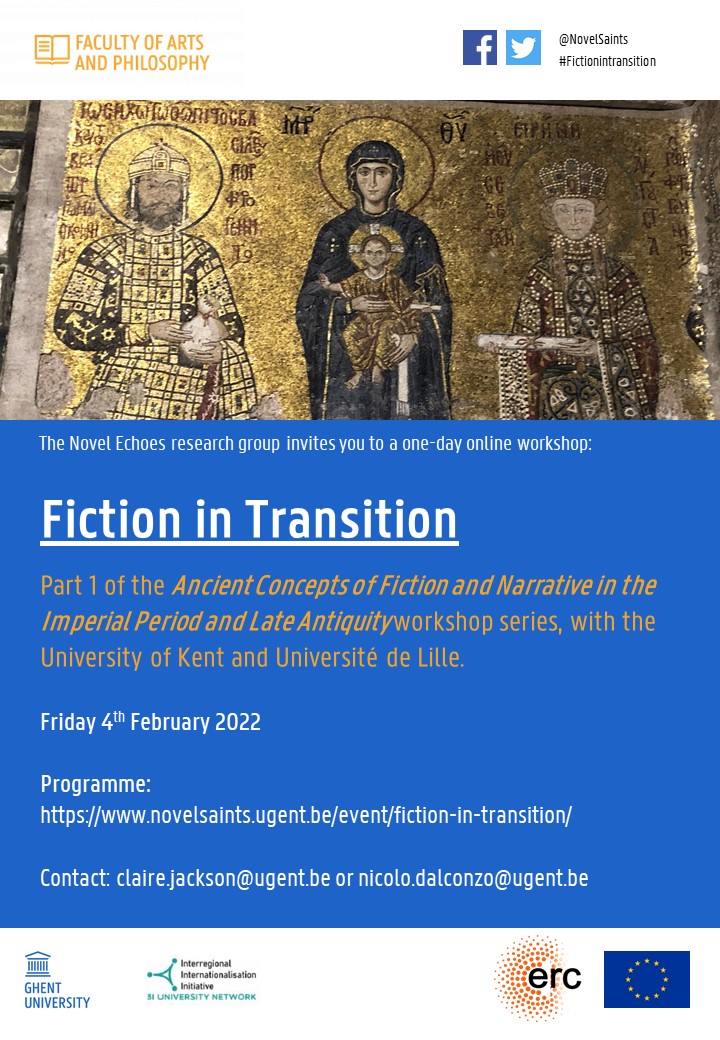We are delighted to invite you to a one-day workshop on The Reuse of Ancient and Late Antique Narratives in the Medieval Middle East and Beyond.
The workshop will be held in the Zaal August Vermeylen in Het Pand (Onderbergen 1, Gent, Belgium) on January 31st, 2023, and will be streamed online via Microsoft Teams.
The workshop focuses on the reception of ancient and late antique narratives across languages and cultures in the Middle Ages and brings together participants from Latin, Greek, Middle Eastern, Iranian, and Georgian studies.
Please register here by January 25th. Please email Mara Nicosia (mara.nicosia@ugent.be) if you have any queries.
Programme
9.00-9.10 Introduction
Work-in-progress session 1
9.10-9.30 Ingela Nilsson (Uppsala University): “Reuse, translation or reception of ancient texts? Methodological challenges”.
9.30-9.50 Lilli Hölzlhammer (Uppsala University): “Christianity vs Homer: the use of quotes and references in Symeon Seth’s Stephanites and Ichnelates”
9.50-10.10 Mara Nicosia (Ghent University): “Homer, Heliodorus and Pseudo-Callisthenes in Antony of Tagrit’s Rhetoric”
10.10-10.30 Discussion
10.30-11.00 Coffee
Lecture 1
11.00-11.40 Teddy Fassberg (Tel Aviv University): “Greek novels and narratives in Arabic”
Work-in-progress session 2
11.40-12.00 Uffe Holmsgaard Eriksen (University of Southern Denmark): “A broader case of reuse: epic and drama in Byzantine hymns”
12.00-12.20 Christian Høgel (Lund University): “The conditions of a Georgian-Greek translator. The Byzantinization of the Barlaam and Ioasaph story”
12.20-12.40 Discussion
12.40-14.10 Lunch
Lecture 2
14.10-14.50 İpek Hüner Cora (Boğaziçi University): “Becoming Ottoman: How an ancient tale gets native in the Ottoman literary world”
Work-in-progress session 3
14.50-15.10 Simon Ford (Ghent University): “An ancient story in a medieval manuscript: the Syriac riddle of the sphynx”
15.10-15.30 Ali B. Langroudi (Göttingen University): “Jesus’ bat among exegetical, apocryphal, and polemical echoes”
15.30-15.50 Lingli Li (Göttingen University): “Sanskrit narratives in Persianate India”
15.50-16.10 Discussion
16.10-16.40 Coffee
Lecture 3
16.40-17.20 Cameron Cross (University of Michigan): “Grammars of globality” (online)
17.20-17.30 Conclusion
Organisers: Mara Nicosia, Koen De Temmerman, Ingela Nilsson.
The workshop is funded both by the European Research Council through the Novel Echoes project hosted at Ghent University and by the Riksbankens Jubileumsfond through the “Retracing Connections: Byzantine Storyworlds in Greek, Arabic, Georgian, and Old Slavonic (c. 950 – c. 1100)” programme hosted at Uppsala University.

